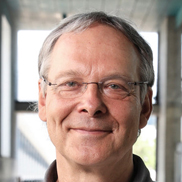Energy-constrained and sustainable deep learning

Michael Unser is Full Professor with EPFL’s School of Engineering and the academic director of EPFL's Center for Imaging, Lausanne, Switzerland. His primary areas of investigation are biomedical imaging and applied functional analysis. He is internationally recognized for his research contributions to sampling theory, wavelets, the use of splines for image processing, stochastic processes, and computational bioimaging. He has published over 400 journal papers on those topics. He is the author with P. Tafti of the book “An introduction to sparse stochastic processes”, Cambridge University Press 2014.
He was born in Zug, Switzerland, on April 9, 1958. He received the M.S. (summa cum laude) and Ph.D. degrees in Electrical Engineering in 1981 and 1984, respectively, from the Ecole Polytechnique de Lausanne (EPFL), Switzerland. From 1985 to 1997, he was with the Biomedical Engineering and Instrumentation Program, National Institutes of Health, Bethesda USA, conducting research on bioimaging.
Dr. Unser has served on the editorial board of most of the primary journals in his field including the IEEE Transactions on Medical Imaging (associate Editor-in-Chief 2003-2005), IEEE Trans. Image Processing, Proc. of IEEE, and SIAM J. of Imaging Sciences. He was general co-chair (with Z.P. Liang) for the first IEEE International Symposium on Biomedical Imaging (ISBI'2002), which was held in Washington, DC, July 7-10, 2002. He is also the founding chair of the technical committee on Bio Imaging and Signal Processing (BISP) of the IEEE Signal Processing Society.
Michael Unser received the Dommer prize for excellence in 1981 (1st rank among all EPFL graduates) and the research prize of the Brown-Boveri Corporation (Switzerland) for his Ph.D. thesis in 1984. He is a fellow of the IEEE (1999), an EURASIP fellow (2009), and a member of the Swiss Academy of Engineering Sciences. He is the recipient of several international prizes including five IEEE-SPS Best Paper Awards, two Technical Achievement Awards from the IEEE (2008 SPS and EMBS 2010), the Technical Achievement Award from EURASIP (2018), and a recent Career Achievement Award (IEEE EMBS 2020). He was awarded three ERC AdG grants: FUNSP (2011-2016), GlobalBioIm (2016-2021), and FunLearn (2021-2026).